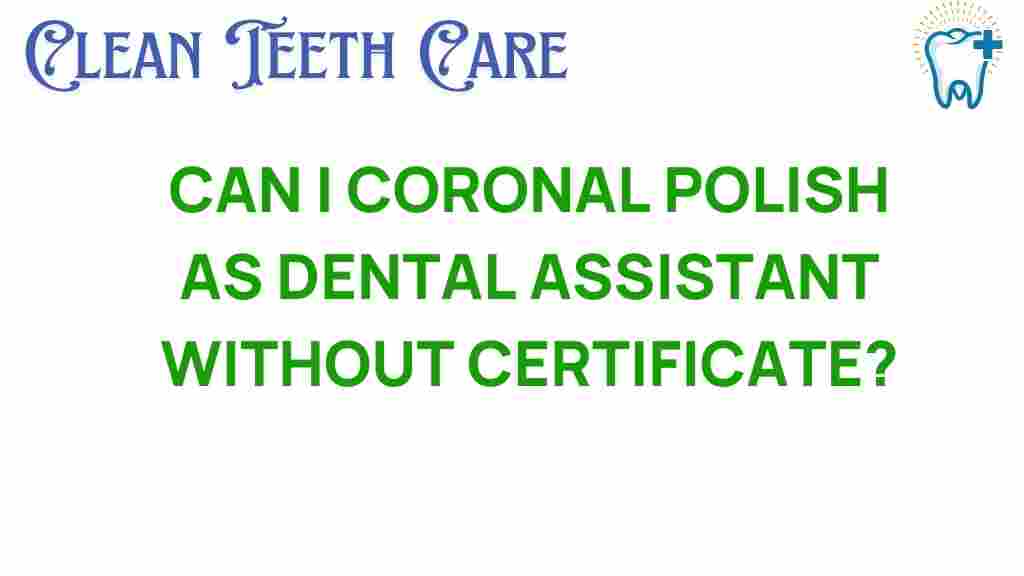Can a Dental Assistant Perform Coronal Polishing Without Certification?
Coronal polishing is an essential procedure in the field of dental care that helps maintain oral hygiene. As a dental assistant, you may wonder whether you can perform this task without the necessary certification. This article will explore the regulations, professional standards, and training requirements related to coronal polishing, providing a comprehensive understanding of what is expected from dental assistants.
Understanding Coronal Polishing
Coronal polishing is a preventive dental procedure that involves the removal of plaque and stains from the tooth surfaces using a polishing cup and a specialized paste. This process not only enhances the aesthetics of the smile but also contributes to better oral health by reducing the risk of cavities and gum disease.
The Role of a Dental Assistant
Dental assistants play a crucial role in supporting dentists during various procedures, including coronal polishing. Their responsibilities may include:
- Preparing the patient for treatment
- Assisting the dentist during procedures
- Providing patient education about oral hygiene
- Performing certain tasks, such as coronal polishing, depending on their certification and training
Certification Requirements for Coronal Polishing
Whether a dental assistant can perform coronal polishing without certification largely depends on the state regulations and professional standards in place. Here are some key points to consider:
- State Regulations: Each state has specific laws governing the practice of dental assistants. Some states require dental assistants to hold a certification in coronal polishing, while others may allow them to perform the procedure without formal certification, provided they have received adequate training.
- Professional Standards: The dental community emphasizes the importance of adhering to professional standards. Even if a state does not mandate certification, many employers prefer hiring dental assistants who have completed a recognized training program.
- Training Programs: Various accredited institutions offer training programs that focus on coronal polishing techniques. Completing such a program not only enhances your skills but also boosts your employability.
Why Certification Matters
Obtaining certification in coronal polishing is beneficial for several reasons:
- Skill Development: Certification programs provide hands-on training and theoretical knowledge, ensuring that dental assistants are proficient in performing the procedure safely and effectively.
- Credibility: A certification demonstrates your commitment to the profession and enhances your credibility with employers and patients alike.
- Career Advancement: Many dental offices prefer or require certified dental assistants, which can open doors to better job opportunities and career growth.
Steps for Dental Assistants to Perform Coronal Polishing
If you are a dental assistant and have the necessary certification or are working under the direct supervision of a licensed dentist, follow these steps to perform coronal polishing:
- Prepare the Patient: Ensure the patient is comfortable and explain the procedure to alleviate any anxiety.
- Gather Supplies: Collect all necessary equipment, including the polishing cup, polishing paste, saliva ejector, and suction device.
- Apply the Polishing Paste: Dip the polishing cup into the paste and activate the handpiece at a low speed to avoid splatter.
- Polish the Teeth: Gently touch the polishing cup to the tooth surface, maintaining a steady and even motion.
- Rinse and Suction: After polishing, instruct the patient to rinse their mouth and use a suction device to remove excess paste.
- Provide Post-Care Instructions: Educate the patient on maintaining good oral hygiene and the importance of regular dental check-ups.
Troubleshooting Common Issues
While performing coronal polishing, you might encounter some challenges. Here are troubleshooting tips for common issues:
- Excessive Splatter: If the polishing paste splatters, reduce the speed of the handpiece and ensure that the cup is adequately fitted against the tooth surface.
- Patient Discomfort: If the patient experiences discomfort, pause the procedure and adjust the pressure applied. Communication is key to ensuring the patient’s comfort.
- Uneven Polishing: For a uniform finish, make sure to cover each tooth surface adequately and apply consistent pressure throughout the process.
Conclusion
In conclusion, whether a dental assistant can perform coronal polishing without certification depends on state regulations and employer policies. While some states may allow it, obtaining certification can significantly enhance your skills, credibility, and career prospects. If you’re interested in pursuing a career as a dental assistant, consider enrolling in a training program that includes coronal polishing as part of the curriculum.
Staying informed about the latest regulations and professional standards is essential for any dental assistant. By doing so, you can ensure that you provide the highest level of oral hygiene and dental care to your patients. For more information on dental assistant regulations, visit the American Dental Association’s website here.
For further reading on dental assistant skills and certifications, check out our article on Essential Skills for Dental Assistants.
This article is in the category Treatments and created by CleanTeethCare Team
